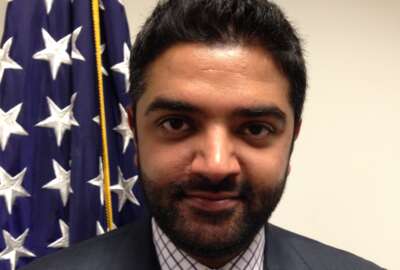Hubbard Radio Washington DC, LLC. All rights reserved. This website is not intended for users located within the European Economic Area.
On Air: Federal News Network
Trending:
King of the Rhode: A state demonstrates what you can do with block chain and data management
Rhode Island officials have deployed a way to streamline identity management for businesses and individuals. It promises to make life easier for government and ...
Rhode Island officials have deployed a way to streamline identity management for businesses and individuals. It promises to make life easier for government and its constituents. For the details, the Federal Drive with Tom Temin spoke with Elizabeth Tanner, Rhode Island’s Secretary of Commerce.
Interview transcript:
Tom Temin And we don’t get too many nonfederal officials on the show, so it’s good to hear from someone at the state level. Let’s begin with the problem that Rhode Island is trying to solve here.
Elizabeth Tanner We’re trying to make it easier to do business. Something I’m incredibly passionate about. We did our research to discover that just about every state has a business register the same way through multiple websites, same information on different forms. And we’re trying to make it easier. So we want to create a single website for you to enter to provide your information with your digital identity, ideally, so that you don’t have to keep saying all that information over and over again.
Tom Temin And does this replace, or does it build on or do you even have any experience in the state with, say, the [Data Universal Numbering System (DUN)] numbers that could be a unique identifier for a business?
Elizabeth Tanner What’s interesting about the DUN number is that most businesses before the pandemic didn’t have them, it seems like a lot of them have received them since then. But pre-pandemic, it wasn’t a common number that most businesses needed. And this is aimed at all businesses of all sizes. So your bigger businesses might have a DUNS, but some of your restaurants and hair salons, they do not.
Tom Temin So you’re not talking about simply businesses that want to do business with the state of Rhode Island as contractors, but simply to do business in Rhode Island and get through the regulatory hurdles they need to get through.
Elizabeth Tanner Initially, will be focusing on registering LLC and corporations, that’s our main project. But we’re also looking at offering credentials for certain professions.
Tom Temin OK. And how do they do it now? It’s just a matter of if you’re a hair salon, that’s one agency. And if you’re, I don’t know, a bowling alley, that’s another agency?
Elizabeth Tanner Well, what’s interesting is when you register your business, pretty much everybody has to file the same paperwork, whether it’s at the Secretary of State’s office, the Department of Labor and Training, as well as the Division of Taxation. That’s what every business has to do. But if you’re a hair salon or a restaurant or a plumber, you need different kinds of licenses and different kinds of permissions to be able to operate. We’re starting initially with that based where everybody fills out the paperwork for the LLC incorporation, and then we hope to build upon it to focus on additional professions. And we’ll be starting with restaurants.
Tom Temin Got it. So one portal, everybody does the same thing and it would end confusion then, sounds like.
Elizabeth Tanner Well, example is that, and we’re still waiting for the budgetary approval for the restaurant space. But you need to use about 11 different websites to open up your restaurant. And ultimately, we’d have that down to one. There might be some federal or municipal interactions, so that might add more, but at least all of the state websites would enter through one singular place.
Tom Temin Got it. I remember the case of New York City trying to get regulatory approval for a super duper European made comfort station, let’s call it, to put on the sidewalk. And there were so many regulations and so many agencies that they determined it was impossible to get it improved, even though the experiment everyone loved it. This device, this kind of a kiosk type of thing. So I understand the problem. And what are the technologies that you’re bringing to this project?
Elizabeth Tanner So it’s interesting. We’ve been very much focused on a simplification of the process. We are looking at, potentially using some blockchain technology. I know the word blockchain makes people nervous. But what’s important to understand is, that blockchain might be related to crypto, but this has absolutely nothing to do with crypto. This is very much focused on distributed ledger technology. I like to call it a souped up Excel spreadsheet, and that’s what we’re hoping to be able to utilize, rather than traditional means of holding information.
Tom Temin Now, when you mentioned that restaurants each have to go to 11 different websites, that means 11 different entities. And so, somehow there has to be an integration of what’s happening with those entities then, right? For someone to be able to go to one website and get through what used to be 11.
Elizabeth Tanner Actually, what we’re looking at would not be an integration of all of them, but instead the ability to answer the questions specific to those agencies. So they would still retain their own software and they would just be connecting to a central, what I call, data lake to provide that information back to each agency.
Tom Temin OK. We’re speaking with Liz Tanner. She’s secretary of commerce for the state of Rhode Island. And is this something that you are doing with state staff developers? Or do you have a contractor in there? What’s your approach, from a business standpoint, of building this application?
Elizabeth Tanner So, of course, we have state staffers, but we do have an RFP out right now to require input from particular body, a software company is what we’re really looking for. Ideally, someone who’s got had experience in doing this kind of work. Not much has been done like this in the United States. We have seen it internationally. And so we hope to copy some of those models. And in a small state like Rhode Island, it’s a great place to test that out.
Tom Temin Well, it’s small, but it’s kind of populist, though, right?
Elizabeth Tanner We have a little over a million people. So some people like to call us a small city, but it’s an absolutely beautiful state that our size is to our advantage. It allows us to be able to do things that bigger states cannot.
Tom Temin Yeah. All right. For some reason, I have Rhode Island pictured much more population just because it’s tucked between New York and Connecticut and Massachusetts, which are bigger states. But yeah, a million years sort of on the New Hampshire size, then roughly.
Elizabeth Tanner We are small but mighty.
Tom Temin All right. And what’s your timeline? When would you like to deploy this? And what will that be, the deployment strategy? Like, start with hamburger joints. And if it works for them, move on to Italian restaurants and lobster shacks?
Elizabeth Tanner We do have some of the best restaurants in America.
Tom Temin I’ve eaten in some of them, and I can attest to that.
Elizabeth Tanner That is true. But initially, we’re focusing on the business registration process, the one that everybody has to follow. We hope to receive budgetary funds to do all restaurants. And then it’s sort of a matter of saying, what’s next? I think we want to grow our credentials. Right now, we’re focused on CPAs. I think we’ll be looking at architects and engineers next. And then it’s a matter of just making it bigger, stronger and better and adding more state agencies on. We’re trying to focus on where businesses most often interact with state government.
Tom Temin Right. So just again, to reiterate the goal, it would be for a given business could go to a single website to do all of the registration with the state required, instead of multiple websites, as is the case now?
Elizabeth Tanner That’s correct. That’s what we’re shooting for.
Tom Temin What prompted this in the first place? Where you hearing complaints from businesses? Or just maybe looking at digital services elsewhere and what’s possible?
Elizabeth Tanner As an attorney myself, I’ve opened up 350 plus LLC and corporations, and I saw how difficult it could be for them to understand what they needed to do. I was blessed to also have the leadership of both Governor McKee (D-R.I.) And current governer McKee and former Governor Raimondo( D-R.I.), now Commerce Secretary Raimondo, who understood and saw the potential for this. And so with their support, we’ve been able to secure funds to take this program to the next phase.
Tom Temin All right. So the budget year for Rhode Island, then, under which you would get funds, would that be July 1? Is that your fiscal year?
Elizabeth Tanner That’s correct. So we do have funds to do the business registration. It’s that opening a restaurant that would be in our next budget cycle.
Tom Temin Got it. All right. So can we check back with you in the next budget cycle and see how the restaurants did?
Elizabeth Tanner And hopefully by then, we’ll have a much better understanding of how we’ve been able to, technologically, set up the business registration process.
Tom Temin And let me ask you this. Often new systems are deployed, and simultaneously, the agency turns off the old one. People flip off the new one, I guess you might say. And if something goes wrong, what is the recourse if the new system is a disaster? I only ask that because I’ve seen that happen.
Elizabeth Tanner We are intentionally making sure that this is boring and not risky. We are focused on what the possibilities are. But if, for some reason, it wasn’t going to work, you can still go through the regular websites. You could still go back to paper if we had to. This is just an alternative way to make it easier to do business.
Tom Temin And by the way, is there any communication you’re having with anyone at the federal level? Or do you think this could be something you could show the feds and say, hey, look what we did for a certain class of constituent, maybe you could.
Elizabeth Tanner I have been blessed to be in contact with many of the other governments that are using this technology and trying to make it easier to do business in their own spaces. And one of them is the federal government, in certain places. So there’s a lot of great things happening in the federal government that are very similar to what we’re trying to do.
Copyright © 2024 Federal News Network. All rights reserved. This website is not intended for users located within the European Economic Area.
Tom Temin
Tom Temin is host of the Federal Drive and has been providing insight on federal technology and management issues for more than 30 years.
Follow @tteminWFED





